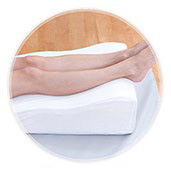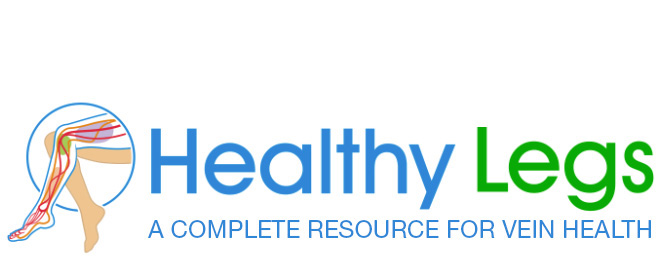You cannot totally prevent spider and varicose veins, but you can do things that may help reduce the risk of them developing or slow their rate of progression.
Preventing Spider & Varicose Veins
 Improving blood flow and strengthening muscle tone can assist your veins in transporting blood back to the heart, reducing the back flow and pooling of blood which leads to spider, reticular and varicose veins.
Improving blood flow and strengthening muscle tone can assist your veins in transporting blood back to the heart, reducing the back flow and pooling of blood which leads to spider, reticular and varicose veins.The following suggestions may be helpful in holding off or slowing progression of these conditions:
- Keep active; regular exercise improves the flow of blood and tones calf muscles. Both of these actions can prevent blood from pooling. Good activities include brisk walking, climbing stairs, cycling and swimming.
- Maintain a healthy weight; losing weight and/or maintaining a healthy weight lessens the pressure on the veins in your legs.
- Consume a high fibre and low salt diet; foods with high salt content encourage your body to retain water, putting extra strain on the venous system as it returns excess fluid to the heart. A low salt diet can help lessen swelling often associated with varicose veins. Constipation can can also put extra strain on the venous system and can be avoided by a high fibre diet, rich in vegetables, fruit and whole grains.
- Avoid high heels shoes; high heels affect the functioning of larger veins. Lower-heeled shoes can actually tone your calf muscles and improve circulation.
- Avoid regular stockings which are very tight at the top, as these will obstruct smooth venous flow. Graduated medical compression stockings are fine, as these help to stop blood pooling in your legs.
- Elevate your legs; this helps the veins return blood to the heart and prevents pooling of blood.
- Change your sitting or standing position regularly. During prolonged sitting (such as a long plane trip) flex your ankles regularly. You can do this 10 times every 10 minutes. You can also move your feet up and down frequently or walk around for a few minutes every hour.This will stimulate blood flow in your feet and legs.
- Avoid too much heat on your legs, such as soaking in hot baths as this can cause your veins to swell, and blood to pool.
Managing Spider & Varicose Veins
Spider and varicose veins tend to develop gradually rather than overnight, so it can be difficult to pinpoint exactly when they first appeared. Once you have become aware of their presence it may be helpful for you to begin using compression stockings in addition to following the prevention steps above, to help manage them and slow their progression.
Compression Stockings
Compression stockings apply pressure to help propel blood back into your deep veins and up out of your legs, thereby reducing the amount of back flow, also called reflux, and pooling of blood. A typical approach to the use of compression stockings is to put them on when you wake up in the morning, wear them throughout the day, and then remove them before you go to bed at night or any other that time you sleep.Wearing compression stockings can:
- Ease aching, heaviness, cramps and swelling
- Slow the worsening of varicose veins
- Reduce the risk of blood clots,especially when you’re seated for a long time such as during long car or plane journeys
Different levels of compression are generally used for specific conditions
10 – 20mmHg:
- A feeling in the legs of heaviness and fatigue
- Mild varicose veins appearing during pregnancy
- Mild varicose veins without significant oedema
- Prevention of thrombosis and embolism (e.g. when immobile or travelling)
- Varicose veins
- After treatment for varicose, reticular and spider veins
- Chronic venous insufficiency (CVI)
- Prevention of DVT and oedema
- Post superficial or deep vein thrombosis
- More severe varicose veins with severe oedema
- Lymphoedema
- Severe cases of chronic venous insufficiency
- Ulcers
- Severe lymphodoema
Compression stockings may help to relieve symptoms and delay progression, however they cannot address the underlying cause even with good compliance. If your veins are continuing to cause you problems, speak with your doctor about what treatment options may be appropriate for you.
Other Remedies
There is some evidence to suggest that the regular use of herbal venotonics may help to improve the health of your veins. These are not an alternative to the clinically proven treatment options available for removing your varicose veins, but in some cases they may offer a level of symptom relief. A range of different venotonics have been proposed including various flavonoids, French marine pine bark extract, horse chestnut extract, red vine leaf extract, and others.The quality and volume of evidence for the safety and efficacy of these venotonics varies dramatically, so speak with your Doctor about whether any of these products might be appropriate and helpful for you.
Pain relievers such as paracetamol, ibuprofen or aspirin may also help to relieve some pain and discomfort. Please discuss the use of these remedies with your doctor.









